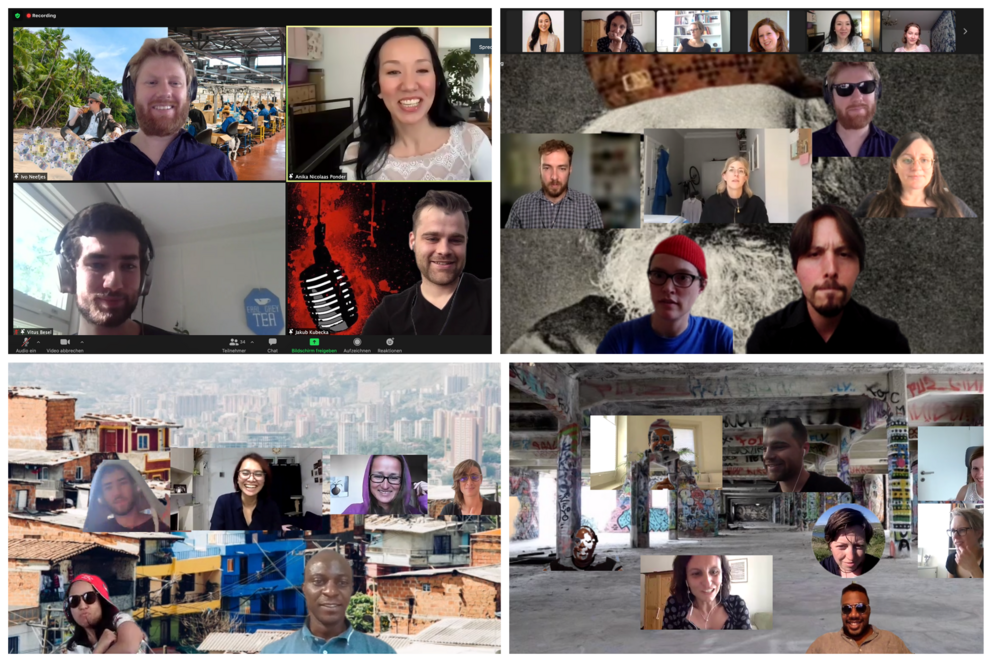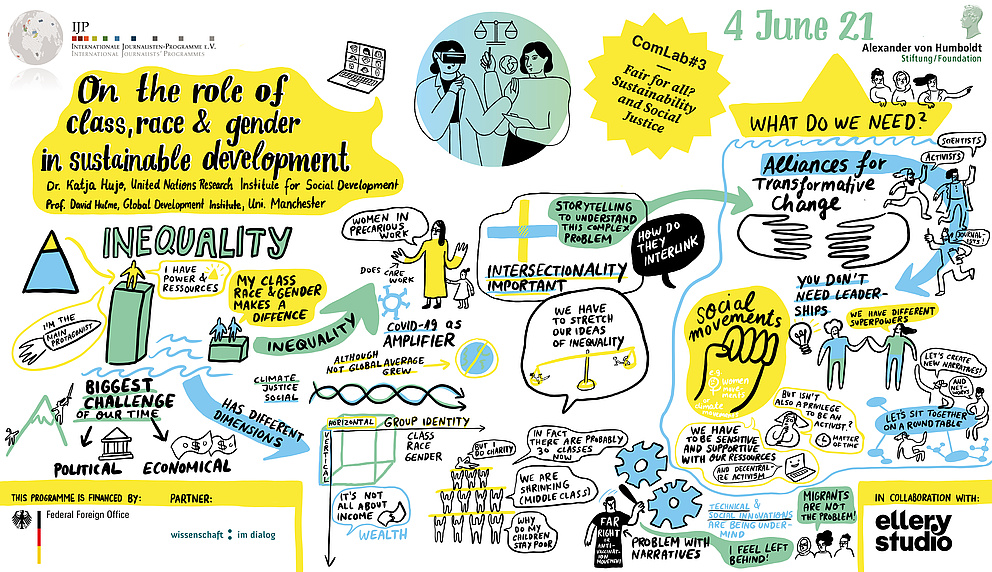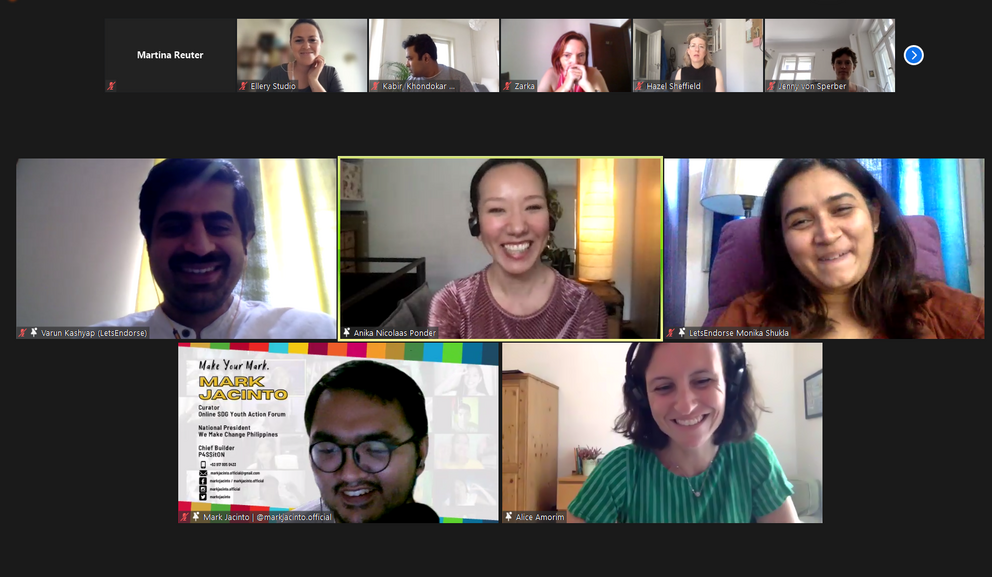

Contact
Press, Communications and Marketing
Tel.: +49 228 833-144
Fax: +49 228 833-441
presse[at]avh.de
It’s all about the big picture: How can we live sustainably? What role do socio-economic aspects play in creating fair livelihoods? Can progress and sustainable transformation be considered in unison? And, if so, how? What role do journalists and researchers play in communicating the social interactions of sustainable development? Here, Mele Pesti reports on exciting presentations by international experts, comments on particular regional features of science journalism, and allows us a first peek at the participants’ ideas for their projects.
Weekend I: 4 – 5 June 2021
The world needs science and great storytelling combined
ComLab, a virtual Research Communication Laboratory for journalists and scientists is here to stay – I certainly hope so. ComLab is something real, engaging and intense – despite the event taking place online, and despite all the cumulative Zoom-fatigue most of us gathered over the last year. Even if initially planned as a real-life event in 2020, being pushed online might have given it this real flavour and amazing reach: participants bravely join in from absolutely all time zones, be it day or night, and chip in with firsthand global knowledge.
The innovative format organized by the Humboldt Foundation and the International Journalists' Programmes brings together fellows of both organizations for two weekends of fruitful discussions. The central topic changes each time, but the main purpose remains the same – to better understand the world, and to find more effective ways of communicating science to a wider audience.
In order not to leave it on the theoretical level, tandems consisting of a journalist and a scientist are formed, who then work together on a journalistic piece based on the research of the Humboldt fellows. They are free to choose the format. Creativity has not been lacking at the first two events. We have learned to look at the world from the perspective of oysters, polar bears and bacteria, to name just a few examples.

ComLab 3: “Fair for all? Sustainability and Social Justice” takes place on 4/5 and 11/12 June 2021. On the first day the most heated discussions centred on the shortcomings of modern day science. Some of the key barriers for the wider public mentioned were access – academic publications being too expensive – but also the need for more attractive storytelling. The latter is exactly where ComLab offers a hand: each participating researcher has the luxury of his or her personal communicator, who is open to inspiration and narration.
Among the most thought-provoking debates of the first day was the mismatch between environmental sustainable development and the roadmap to social justice. Those two huge paradigms cannot be looked at separately, for various reasons – but in reality the organizations that look for solutions often focus only on one side. Many participants highlighted that activism in both fields is not viable unless one is part of the privileged elite, especially in the Global South. Activism, at times, is a luxury most of the world’s disadvantaged cannot afford to engage in.

The second day of ComLab 3 started with a sharp and provoking panel on the future of education. Professor Arjen Wals from Wageningen University gave an unforgettable talk with a telling title: “Re-orienting Education in Times of Systemic Global Dysfunction – a Transformative Learning Perspective”. Despite serving as the UNESCO Chair of Social Learning and Sustainable Development, Professor Wals questioned the very term “sustainable development”, which clearly embodies a contradiction in terms. Sustaining means keeping what you have, but the constant push for development takes us to a whole different direction, leading to the “good old” progress myth. That makes one think about what is to be sustained when we talk about sustainable development. Is the subject of sustainability still the earth, society, environment, humankind, or is there an underlying assumption with regard to our global goals, informed by capitalism, that we need to sustain growth in itself?

The neoliberal commodification of everything, including water, land, knowledge is the hidden agenda, or hidden curriculum of unsustainability, according to Professor Wals. There is the “tyranny of innovation”, but actually conservation is as important as innovation: one needs to reflect and think deeply every once in a while. “There seems to be a push for personal growth to become more marketable as a person – this is a problem!” In education we first need to decide what needs sustaining, and what needs disrupting. “Without the latter, we would be only re-arranging furniture on the Titanic,” Wals said.
The second speaker, Professor Boike Rehbein from Humboldt-Universität zu Berlin, started with a provocative take on the role of education regarding social justice. “Education usually reproduces and legitimizes social inequality,” he said, offering the example of Germany, where in 80% of the cases the level of a person’s education directly reflects their social class.
“Why are the great football players, who earn so much money, nearly never rich in older age?” Professor Rehbein challenged his audience. The apparent reason is the lack of other aspects besides money that social class also consists of, such as network and social skills. And improving education and access to education alone will not reduce inequality. Inequality is – and seems to remain – one of the main obstacles for a sustainable world.
ComLabs never stop at identifying global problems: through intense discussions and extremely well-informed questions the group always manages to come up with hints at solutions and calls to action. Besides the disruption of education, a need for the disruption of the “extractivist science” was also called for. The extractivist mindset – which seeks to extract as much high-value resources in as short a time as possible – should be replaced by open access to data, results, and more activist science and journalism.
If that rhetoric starts to sound much like a call to arms and a preparatory meeting for a revolution, then don’t be alarmed: Among the speakers at ComLab we find the leading voices of major science institutions – all of them seem to share the desire for systemic change. Science needs to be heard more – if the global attempts to contain the pandemic have not taught us anything, we should have learned that much by now. Science needs to express itself more clearly, science needs to be heard and understood by the people, science needs good storytellers. ComLab is here to stay, to take us towards this direction, one step at a time.

Weekend II: 11 –12 June 2021
“You need to really want to get the message through!”
“There has been more appetite for science over the last ten years”. Alok Jha, science and technology correspondent at The Economist, started his talk at ComLab on a positive note. If just over ten years ago science reporting meant taking a journal article and telling people about amazing things going on in space or a new dinosaur fossil being found – the kind of archetypical science story – then this is considered something of a caricature now, he added. Nowadays, science reporting is integrated into normal media work: understanding the statistics, deciding if a paper’s findings are of any use, deciding upon a policy and trying to understand how the algorithms work.
On the second weekend of ComLab, the participants were in the limelight: ten promising young scholars, Humboldt Fellows from different scientific fields, and ten journalists, fellows of the International Journalists’ Programmes. As contemporary approaches to education have shown: the fountain of knowledge worth sharing is not contained within one person standing in front of the classroom (or Zoom screen), preaching at a passive crowd. The diversity of knowledge, experience and skills is always greater if everybody in the room is identified and empowered as a possible teacher.
Clearly, this principle is respected in the ComLab format where participants of sixteen different nationalities combine and contrast their knowledge and diverse experience. The second half of ComLab started with exactly that: journalists and scientists contributed to a shared pool of tools. The best current tools for transcribing, video editing or statistics processing – you name your problem and here is your colleague from the other side of the globe who offers a quick solution. There are too many good apps out there. That’s when friendly advice from another professional who is familiar with the tool and has integrated it into his or her work is worth more than anything.
The same truly useful and global exchange applied to the regional reporting block. We heard firsthand accounts from journalists and scientists on how science reporting is doing right now in their region. The loudest and grimmest voices certainly came from Brazil: the country where both scientific and media freedom have been under intense attack over recent years, and where the president has driven his country into a full-blown catastrophe precisely under the banner of science denial.
If ComLab created its own media outlet, it would surely be a unique, incredibly well informed and diverse one.
To add some optimism to the unavoidably somewhat sombre overall topic of sustainability and social justice, we also heard some great real-life stories where social innovators have taken upon themselves the task of finding solutions. Monika Shukla and Varun Kashyap, Humboldt German Chancellor Fellows, introduced a truly inspirational initiative from India called Let’s Endorse: a large community of social innovators who solve social issues sustainably and effectively. It’s a marketplace and a technology platform with over 500 social innovators from 40 countries across the globe, brought into contact with a web of over 2,000 NGOs from all over India, plus corporations, philanthropists, volunteers and the government. They are ensuring the livelihoods of unemployed or underemployed low-income households, helping them to become job creators, instead of job-seekers, which has become especially important in the context of massive reverse migration and jobs slowdown aggravated by the COVID-19 pandemic.
In another session, we heard from Dr Diana Stanciu from the Romanian Young Academy, who won the Humboldt Alumni Award for Innovative Networking Initiatives in 2020. The Young Academy brings high-level young researchers together, groups them by their research topics, and holds meetings and discussions on both scholarly topics and civic engagement. The project is outstanding in providing the researchers with a very real collaborative and cross-sectional experience of working with real-life population groups and actual problems, functioning also as an independent think tank proposing viable solutions for future public policies.

The main tangible result of the ComLab will be the journalistic pieces informed by the joint work. Closer to the end of the workshop, the participants had the extremely valuable opportunity to learn from the best. Damian Carrington, the editor of the Guardian’s environment section offered his tips on how to successfully pitch a science story. The classic question was asked, and answered, about how to keep the attention of a very busy person who most probably has about five seconds to spare for a an e-mail, before hitting the delete button.
A day later, these tips were put into practice in a real-life “Pitch Your Project to the Guest Juror” session featuring Alok Jha from The Economist. The ten pairs presented their story ideas, born out of the cooperation that had lasted only a week. And they were impressively elaborated ideas. In the coming months, we can expect new stories around the world popping up in different formats. But we can’t give it away here. Stay tuned! If ComLab created its own media outlet, it would surely be a unique, incredibly well informed and diverse one. The world has long become globalized and most of us digest media from different countries and continents daily. But we are still lacking the truly global cooperation projects where journalists and scientists on different continents simultaneously work on aspects of the same story. This kind of project can bring home the perception of sharing the globe and its main challenges even more intensely.
Stories are here to stay. Everybody needs them, everybody tells them in their private life pretty much every day: talking about your day to a friend, explaining an aspect of the world to a kid. But understanding what science tells us about our world, and putting it into a simple, easy to read story, is still a higher art we need to keep on perfecting. Pitching any story, including a science story, is like gossiping, one of the guest speakers explained. You need to really want to get your message through. ComLab has taken another big step towards giving people tools to do just that.

Mele Pesti
Mele has a strong background in academia, media, and communication. Having spent years on analysing and communicating about Latin American societies and cultures in Europe, she has now widened her focus on mediating knowledge about world affairs. She has also worked as a cultural journalist and two months as an IJP Fellow for RND Berlin office, writing about Estonian politics. She also received the special award of ComLab#1 for her children’s book, "The Life and Adventures of Brandon B. and Bea P."
